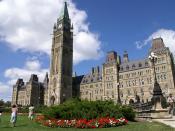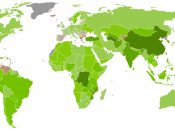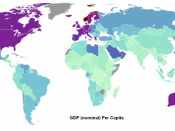The GDP, or Gross Domestic Product, is one of the main financial keys of measuring the size of a country's economy. The general definition of GDP of a country is the total market value of all final goods and services produced in a given period of time (usually in a calendar year).
GDP in Expenditure Method GDP can also be referred as the National Income (Y) that measures the economy's overall performance in monetary form throughout the year. Viewing GDP in Expenditure approach is to add up the total money spent in buying the final products and services. This can be derived by the sum of the Personal Consumption Expenditures (C), Gross Private Domestic Investment (I), Government Purchase (G) and the Net Exports (X-M, the difference in exports (X) and imports (M)). (Brue 2005) Canada will be used as example on how its GDP of C$1,537,472 was achieved for Q3/2007 (figures are in millions).
(Canada: Economic and financial data 2007)C, Personal Consumption ExpendituresC is a measure on how much expenditure on both durable (e.g. computers, air conditioners) and non-durable (e.g. food, shampoo, pens) consumer products and services are spent by individual household. This figure had been indicated as high as C$854,152 for Canada.
I, Gross Private Domestic InvestmentI refers to the total amount of investments spent within the country by firms and businesses. This value comprises of purchases of (1) non-residential investments such as capitals spent on purchasing softwares, machines, etc, and (2) residential fixed investments such as renting and leasing of apartments and offices and so on. These 'unconsumed output' will raise the inventories that represent as investments. The total amount of I for Canada was stated as C$317,156.
G, Government PurchaseG is the expenditure on final goods and services by the government. This includes the wages...


